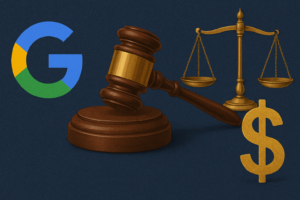Google Agrees to $100 Million Settlement in Google Ads Class Action Lawsuit

Google has reached a preliminary agreement to pay $100 million settlement in Google Ads class action lawsuit that accused the tech giant of overcharging advertisers. The lawsuit, which dates back to 2011, claimed that Google misled advertisers regarding discounts and ad placements, particularly through its AdWords platform, now known as Google Ads.
Key Takeaways: Settlement in Google Ads Class Action Lawsuit
- Google will pay $100 million to settle claims of misleading advertising practices.
- The lawsuit involved allegations of overcharging and failure to provide promised discounts.
- The settlement covers advertisers who used AdWords from January 1, 2004, to December 13, 2012.
- Google denies any wrongdoing but is pleased to resolve the case.
Settlement in Google Ads Class Action Lawsuit: Background
The class action lawsuit, initiated in March 2011, accused Google of breaching its contract with advertisers by manipulating its Smart Pricing formula. This manipulation allegedly resulted in reduced discounts for advertisers, contrary to what was promised. Additionally, advertisers claimed that Google failed to restrict ad distribution to the geographic areas they specified, violating California’s unfair competition law.
The case has been lengthy and complex, involving extensive evidence gathering, including over 910,000 pages of documents and multiple terabytes of click data from Google. The legal proceedings included six mediation sessions with four different mediators, highlighting the intricate nature of the dispute.
Settlement Details
The proposed settlement, filed in a federal court in San Jose, California, requires judicial approval before it can be finalised. It is designed to compensate advertisers who participated in the AdWords program during the specified period.
- Settlement Amount: $100 million
- Eligible Period: January 1, 2004, to December 13, 2012
- Plaintiffs’ Legal Fees: Up to 33% of the settlement fund, plus $4.2 million for expenses
Settlement in Google Ads Class Action Lawsuit: Google’s Response
In a statement, Google spokesperson José Castañeda expressed satisfaction with the resolution, stating, “This case was about ad product features we changed over a decade ago and we’re pleased it’s resolved.” Despite the settlement, Google maintains that it did not engage in any wrongdoing.
Implications for Advertisers
This settlement underscores the importance of transparency in digital advertising practices. It may prompt stricter regulations and increased scrutiny of advertising platforms, encouraging companies to demand clearer and more reliable ad practices. For advertisers who used AdWords during the specified timeframe, this settlement could provide direct financial compensation, reinforcing the need for vigilance in monitoring ad performance and billing practices.
Conclusion: Settlement in Google Ads Class Action Lawsuit
The resolution of this 14-year legal battle marks a significant moment in the ongoing discourse surrounding digital advertising regulations. As Google navigates this settlement, it continues to face other legal challenges, including federal antitrust lawsuits that could reshape its operations in the advertising technology sector. The outcome of this case may influence future legal standards and practices within the digital advertising landscape.
Sources
Author
Search Blog
Free PPC Audit
Subscribe to our Newsletter
The Voices of Our Success: Your Words, Our Pride
Don't just take our word for it. With over 100+ five-star reviews, we let our work-and our satisfied clients-speak for us.
"We have been working with PPC Geeks for around 6 months and have found Mark and the team to be very impressive. Having worked with a few companies in this and similar sectors, I rate PPC Geeks as the strongest I have come across. They have taken time to understand our business, our market and competitors and supported us to devise a strategy to generate business. I value the expertise Mark and his team provide and trust them to make the best recommendations for the long-term."
~ Just Go, Alasdair Anderson

